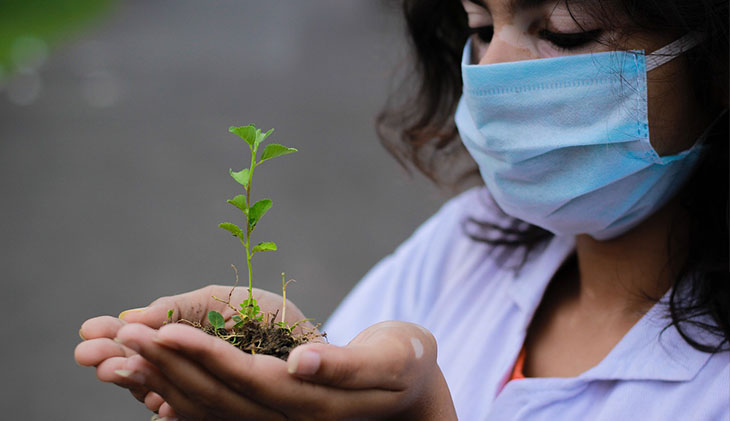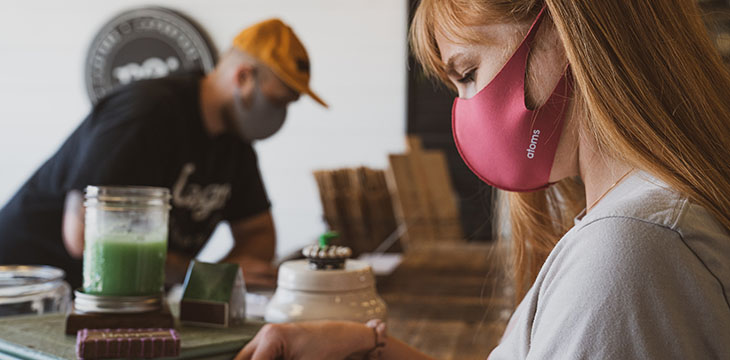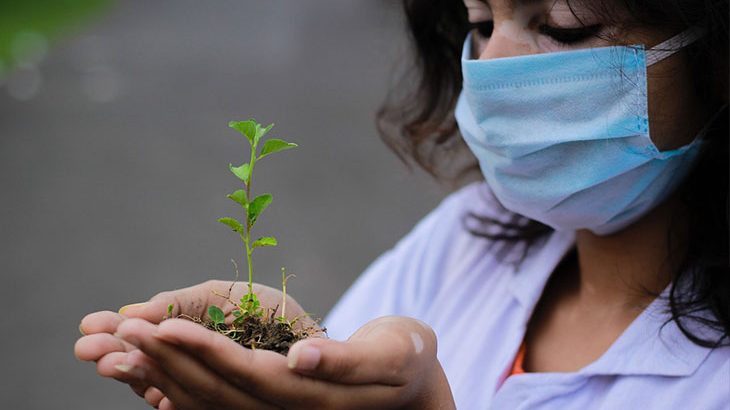
What are the environmental impacts of disposable face masks?
It is estimated that 7,200 tonnes of medical waste is generated daily during the Covid-19 pandemic, a large portion of which is disposable masks. Around the world, 129 billion disposable masks are used every month, approximately 3 million masks every minute.
Face masks are essential for keeping us safe during the pandemic and whilst face mask pollution was not our primary concern when our lives were turned upside down, the effects of improper disposal of face masks are quickly becoming a reality.
Face masks and the environment
Single-use face masks are not recyclable due to the fabric containing a mix of polypropylene and polyester which cannot be separated correctly for recycling. This results in a great deal ending up in landfill, or worse, littered face masks are blown into rivers and streams which carry them out to sea. The extent of face mask pollution in the ocean is quite astounding, with scientists recording approximately 70 disposable masks per 100 metres of shoreline. They have even been found on uninhabited islands such as the Soko Islands in Hong Kong.
PPE, including disposable face masks and gloves, are made from multiple plastic fibres. The main component, polypropylene, will remain in the environment for up to 450 years as it slowly breaks down into microplastics. A single disposable mask can release up to 173,000 microfibres into the ocean which can then be ingested by aquatic life, causing damage to them and to us as the microplastics enter the food chain. In addition to the harm that microplastics cause, disposable masks have also been found to contain lead, antimony and cadmium, all of which are toxic to humans and animals even in low doses.
Pollution caused by face masks is a serious issue and action needs to be taken to reduce the damage caused to the environment. It doesn’t look like we will be free of wearing masks for a long time yet and the damage caused could become irreversible if we don’t make changes now.
Face mask waste management
Disposable face masks are non-recyclable due to the fabric composition but also due to their size, they can easily get caught in recycling machinery and cause damage. If you want to dispose of single-use masks correctly, there are a couple of options:
- Dispose of masks in hazardous waste. This is readily available in all medical facilities.
- Put your mask in a sealed bag until you can access a bin and dispose of it with normal waste for landfill.
Reusable face masks

Unless you work in a medical facility where it is a requirement to wear single-use masks, the majority of people have the option to swap over to reusable masks. Reusable masks have many benefits both for the environment and from a fashion point of view.
The Plastic Waste Innovation Hub at University College London has estimated the demand for face masks in the UK to be 24.7 billion masks per year. If only reusable masks were used, the demand would reduce to 136 million per year.
Reusable face masks are more expensive than disposable masks initially, however, in the long run, they will save you money. Reusable masks can be washed as often as needed and providing they are cared for as per the manufacturer’s instructions, can last you months or even years. The different fabric compositions of reusable masks that are available also mean that there is a style suitable for everyone. Masks made from cotton are great for those with allergies or sensitive skin and for those that are environmentally conscious, there are even organic cotton and recycled polyester options available.
Reusable personalised face masks
Custom branded face masks are not only a better option for the environmental benefits, but they can look great too. Children are less likely to feel comfortable wearing face masks, therefore, washable face masks make for a great alternative as they can be customised with patterns and images. A mask in their favourite colour or with their favourite cartoon character might just be enough to tempt them to keep their mask on when required.
Additionally, wholesale reusable face masks for work have become popular during the pandemic. Masks can be customised with a company’s logo which is great for advertising when staff are out in public and can create a feeling of inclusivity if staff work from home. Custom face masks for sports are also possible. Your team’s name or logo can be printed on the mask to match with the rest of your sports kit, making a smart alternative to disposable masks when playing away from home.
How to care for reusable face masks
The longevity of your reusable face mask will depend on how it is cared for. It is important to follow manufacturer guidelines so that you don’t shrink or damage your mask. Although washable face masks are reusable, it does not mean that you should continue to wear your mask indefinitely without washing it, it can still harbour bacteria and viruses as much as single-use masks.
Reusable face masks should be washed every time they are worn, even if only worn for five minutes in the local shop. They can be washed simply by hand or in the washing machine if you have the time, however, they need to be washed at a hot temperature and with appropriate bleach or cleaning solution. The University College London found that machine washing disposable masks had the lowest environmental impact overall as hand washing was found to use more water and detergent per mask. If you are concerned about releasing microfibres into the environment, there are some great microfibre filters available on the market that are easy to install and reduce the environmental impact even further.
As soon as you see signs of wear and tear such as holes on your mask, it’s time for a new one, any damage to the mask can make them ineffective at preventing transmission of viruses.
When it comes to asking which is better, single-use or reusable masks, the answer is clear. Reusable masks dramatically reduce the impact on the environment, are cheaper overall and can be customised. If you have the option to wear reusable masks when possible, this small change can help to protect our environment until, hopefully, they are no longer needed.
If you’d like to design your own face mask for your brand, business or team, find out more about our Personalised Reusable Face Masks.
Please note, our reusable face masks are not medical devices or personal protective equipment (PPE).


